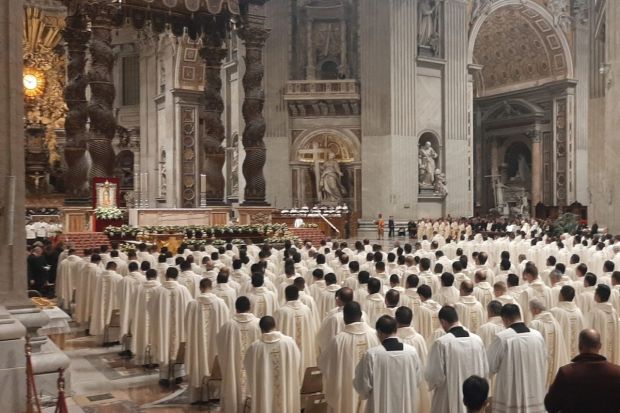Lenten Campaign 2025
This content is free of charge, as are all our articles.
Support us with a donation that is tax-deductible and enable us to continue to reach millions of readers.
As is tradition, on the evening of December 12, the feast of Our Lady of Guadalupe, Pope Francis celebrated Mass in St. Peter's. His brief homily reflects his typical spiritual practice: Drawing insight from words, the smallest details of images, etc.
Here is an Aleteia translation of his reflection, which was given in Spanish.

~
The first thing that comes to mind is the image of the Virgin imprinted on the tilma.
It is the image of the first disciple, of the mother of believers, of the Church herself that is imprinted in the humility of what we are and have, which isn't worth a lot, but will be something great in the eyes of God. It is imprinted in the tilma.
The Virgin requests of Juan Diego a small effort: to gather the flowers. The flowers, in mysticism, signify the virtues that the Lord instills in the heart; they are not our work. The act of gathering them reveals to us that God wants us to accept this gift, that we perfume our weak reality with good works, uprooting hate, fear.
If you notice, in the message of Guadalupe, the words of the Virgin: "Am I not here, I who am your mother?" take on a new meaning. This "am" of the Virgin, this "am [here]" is being permanently imprinted in our poor clothing, perfumed with virtue gathered in a world that seems incapable of producing it. Virtues that fill our poverty in the simplicity of small gestures of love, which progressively illumines our tilma, without us realizing it, with the image of a Church that carries Christ in her womb.
The image, the tilma, the roses: This is the message. Simple as that, without varnish. Together with the certainty that She is my mother, and that She's here. And this message defends us from so many social and political ideologies that the Guadalupan episode is so often used to justify, to support, to bring in money. The Guadalupan message does not allow ideologies of any type. Just the image, the tilma, the roses.










